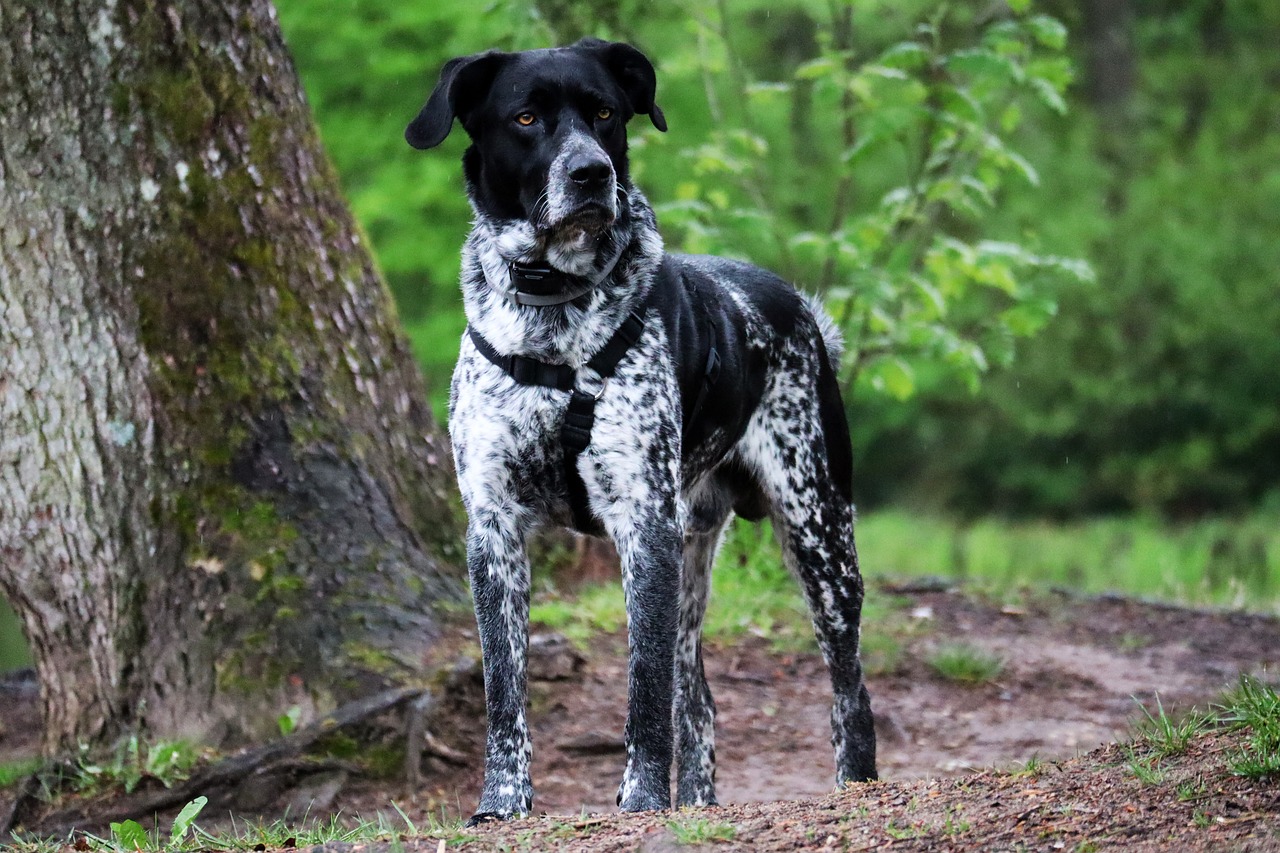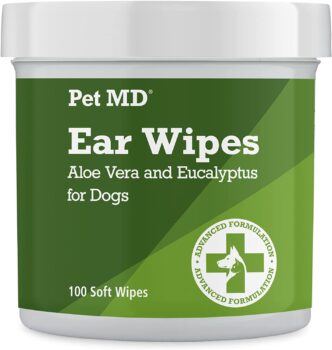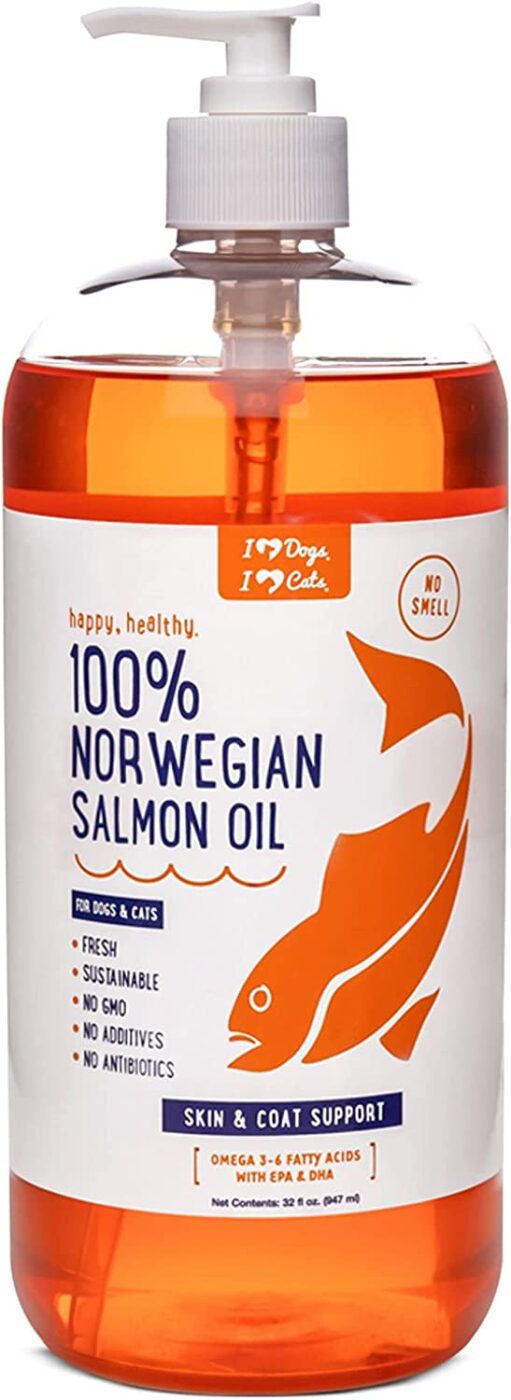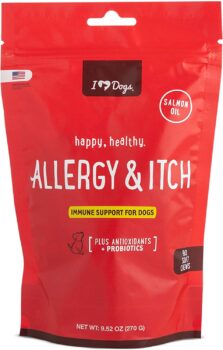
Ear infections are a common issue in dogs, and some breeds like the German Shorthaired Pointer are more susceptible due to their long, pendulous ears. This article will explore 11 different methods to treat and prevent ear infections in this breed and highlight the role Omega-3 plays in combating allergies, which can contribute to ear infections.

iHeartDogs is reader supported. Some of the links below may be paid affiliate links, where we receive a small commission on a product at no additional cost to you.
1. Regular Ear Cleaning
Regular cleaning is essential to keep your Pointer’s ears free of dirt and moisture, the two leading causes of ear infections. Using a gentle, dog-safe ear cleaner and a cotton ball, gently wipe the inside of the ear flap and the accessible parts of the ear canal.
Our favorite ear cleaner is these PetMD brand ear wipes on Amazon.
2. Keep Ears Dry
German Shorthaired Pointers are water-loving dogs, which can predispose them to ear infections due to moisture accumulation. Always ensure to dry their ears thoroughly after swimming or bathing to reduce this risk.
3. Regular Vet Checkups
Preventative vet checkups allow for early detection of possible ear infections. Your vet can provide recommendations tailored to your dog’s needs.
4. Proper Diet
A balanced diet is vital for your Pointer’s overall health, including their ear health. Omega-3 fatty acids play a crucial role in managing allergies, which can contribute to ear infections.
5. Omega-3 Supplements
Omega-3 fatty acids are beneficial for German Shorthaired Pointers due to their potent anti-inflammatory properties. They help reduce the body’s allergic response, which can reduce ear inflammation and the chances of ear infections. Omega-3 supplements are widely available and can be added to your dog’s diet after consulting with a veterinarian.
We’re fans of this Norwegian salmon oil on Amazon. It’s a bright orangish-pink color and has no fishy smell at all due to it’s ultra high purity.
6. Regular Grooming
Regular grooming, including trimming the hair around the ears, can improve air circulation and reduce the likelihood of ear infections.
7. Avoid Allergens
Like humans, dogs can also be allergic to certain substances like pollen, dust, and certain food ingredients. Identifying and avoiding these allergens can significantly reduce the risk of ear infections.
A few good supplements to help your dog’s allergies are apple cider vinegar, quercetin, and colostrum, all of which are found in many natural allergy supplements like this one.
8. Use of Prescription Medication
In case of an ongoing infection, your vet may prescribe antibiotics or antifungal medication. It’s vital to administer the medication exactly as directed to ensure the infection is eradicated.
9. Use of Probiotics
Probiotics can improve your dog’s gut health, thereby boosting their immune system and reducing the chances of ear infections.
10. Maintaining a Healthy Weight
Obesity can lead to various health issues, including increased chances of ear infections. Maintaining a healthy weight through diet and exercise can help in prevention.
11. Reduce Stress
Stress can weaken your dog’s immune system and increase the risk of infections. Regular exercise, mental stimulation, and a stable environment can help reduce stress levels.
FAQs
1. What are the signs of ear infections in German Shorthaired Pointers?
Signs may include head shaking, scratching at the ears, redness, swelling, an unusual smell, and discharge from the ear.
2. Are German Shorthaired Pointers more susceptible to ear infections?
Yes, due to their long, pendulous ears that can trap moisture and dirt, they are more prone to ear infections.
3. How often should I clean my German Shorthaired Pointer’s ears?
Weekly cleaning is generally recommended. However, your vet may suggest more frequent cleaning depending on your dog’s health.
4. Can diet influence ear infections?
Absolutely, a balanced diet can boost your dog’s immune system, and specific components like Omega-3 fatty acids can help manage allergies that contribute to ear infections.
5. How does Omega-3 help with ear infections?
Omega-3 fatty acids have potent anti-inflammatory properties that can reduce the body’s allergic response, reducing ear inflammation and the chances of ear infections.
6. How can I add Omega-3 to my dog’s diet?
Omega-3 is naturally found in fish like salmon and mackerel. There are also plenty of dog-friendly Omega-3 supplements available.
7. Can I treat my German Shorthaired Pointer’s ear infection at home?
While minor infections can sometimes be managed at home, it’s best to consult a vet for a proper diagnosis and treatment plan.
8. Can ear infections in German Shorthaired Pointers lead to more serious conditions?
Yes, if left untreated, ear infections can lead to more severe conditions like deafness or systemic infections.
9. How can probiotics help in preventing ear infections?
Probiotics can enhance your dog’s gut health, boosting their immune system and lowering the chances of infections, including those of the ear.
10. Is there a specific age when German Shorthaired Pointers start developing ear infections?
Ear infections can occur at any age. However, they are more common in puppies due to their developing immune systems and in older dogs with weakened immunity.
Implementing these methods can go a long way in preventing and treating ear infections in German Shorthaired Pointers. By maintaining a holistic approach to their health, including regular grooming, Omega-3 supplementation, and stress management, you can ensure a happier and healthier life for your canine friend.
The post 11 Ways to Treat & Prevent Ear Infections in German Shorthaired Pointer appeared first on iHeartDogs.com.
via Whisker Therapy


